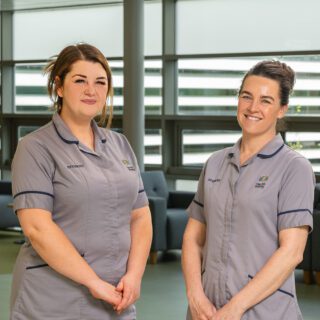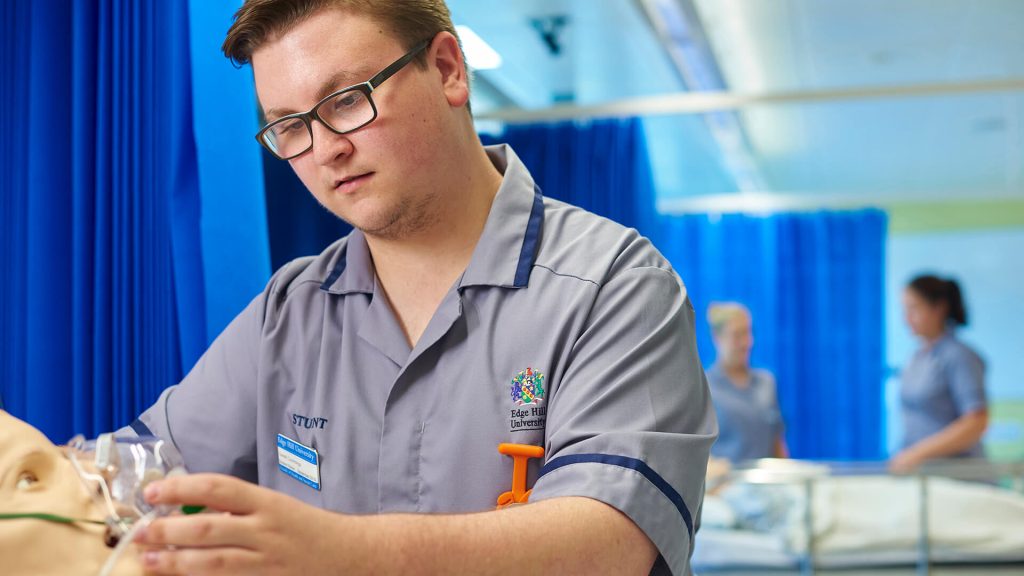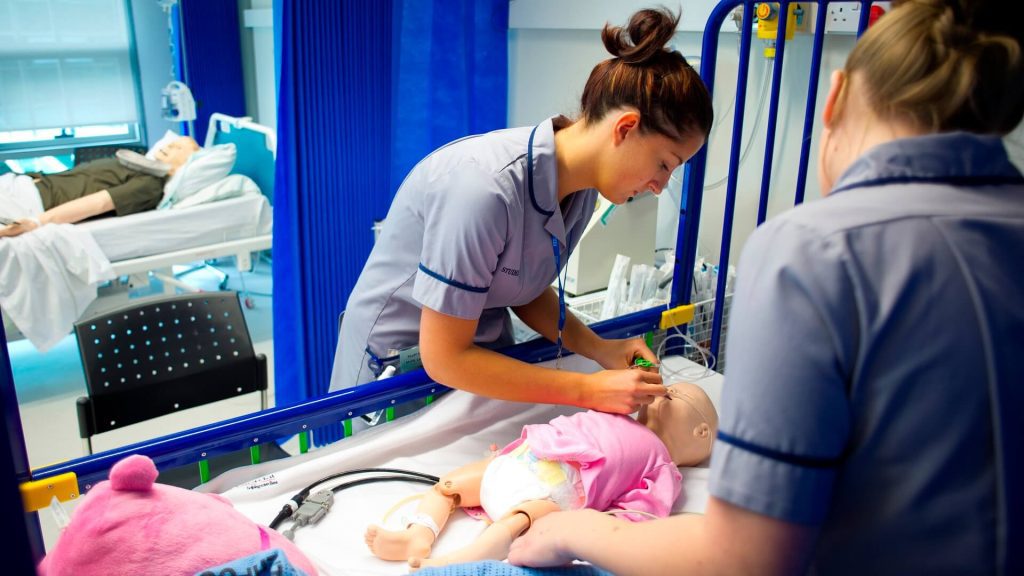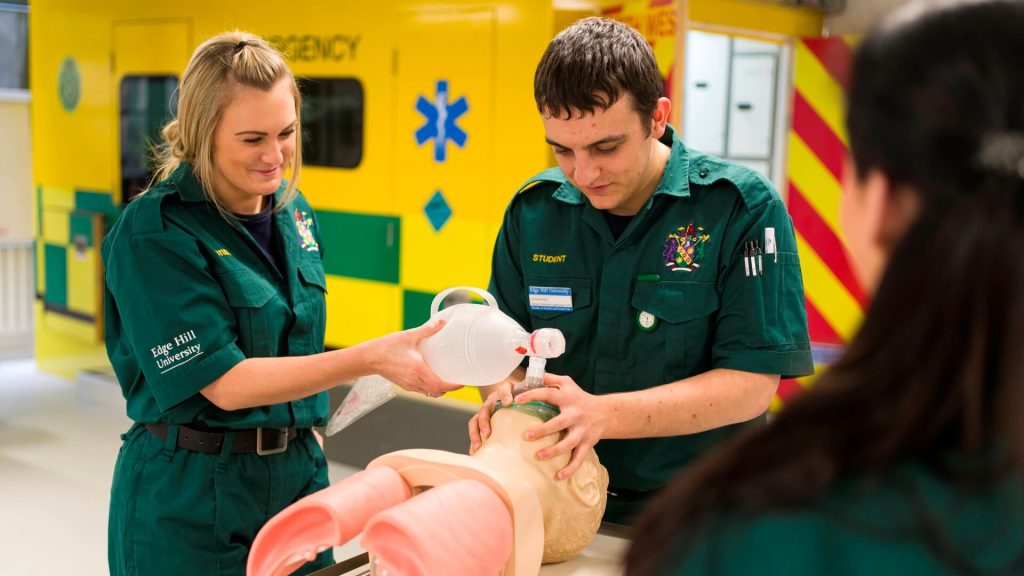Midwifery BSc (Hons)
UCAS code: B720
Midwives are central to caring for women, newborns, birthing people and their families. They are experts in, and the lead professionals for, people experiencing normal childbirth. On completion of the programme students are eligible to register as a qualified midwife with the Nursing and Midwifery Council.
Closed to applications for September 2025. You may be interested in BSc (Hons) Nursing (Adult).
Overview
| Course length: | 3 years full-time |
|---|---|
| Start dates: | September 2025 September 2026 |
| Location: | Edge Hill University (full-time) |
| Example offers: | BBB-ABB (A Level) or DDM (BTEC) View full entry criteria |
| Subject(s): | Midwifery |
| Faculty: | Health, Social Care and Medicine |
| Department: | Nursing and Midwifery |
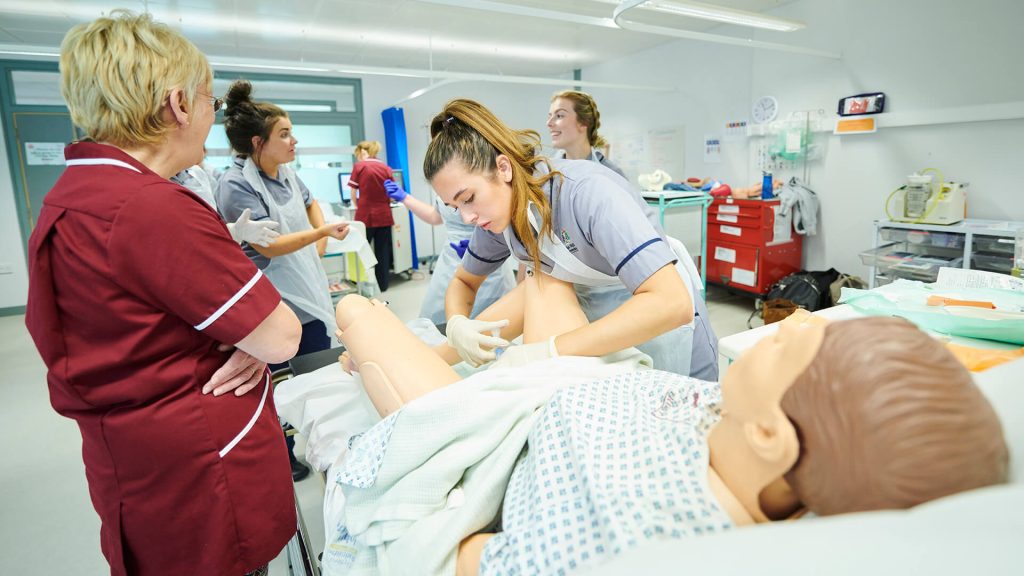
Closed to applications for September 2025. You may be interested in BSc (Hons) Nursing (Adult).
The BSc (Hons) Midwifery degree will equip you to become a skilled, knowledgeable, competent and compassionate midwife, able to provide holistic person-centred care across a range of midwifery and neonatal settings.
You’ll develop the skills to build relationships with women, birthing people and their families, and be equipped to respond to their changing needs during pregnancy, birth and beyond.
Throughout the midwifery course, you’ll learn the value of evidence and research, and feel confident that you can deliver safe, high quality care to prepare you for the challenges of midwifery in modern day maternity services.
While you’re training to become a midwife, you’ll engage in a range of experiences in person-centred midwifery care, and prepare for excellent career opportunities within the UK and abroad.
An NMC approved degree
On successfully graduating from your midwifery course at Edge Hill, you’ll be eligible to register as a qualified midwife with the Nursing and Midwifery Council. You’ll be able to work as a midwife in a variety of clinical settings including hospitals, the community, birth centres and independent practice.
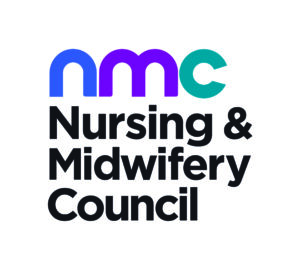 Nursing & Midwifery Council
Nursing & Midwifery Council
Course features
-
Professional accreditation
-
Professional practice placements
What you'll study
This midwifery course adheres closely to the six core values of the NHS. These values, enshrined within the NHS Constitution, have been developed by patients, the public and staff to inspire passion in the NHS, guide it in the 21st century, and provide common ground for cooperation in achieving shared aspirations.
Themes
Adopting a non-modular approach, the curriculum is aligned around three core progressive strands, each of which covers a distinctive year of study.
Year 1: Foundations of Midwifery Practice (120 credits) introduces a variety of concepts to empower you to develop the knowledge, skills and competencies required to participate in the safe and effective delivery of care. This year of study will lay the foundations of professionalism, values and partnership working which will enable you to respond to the professional needs of key maternity drivers to safeguard the public. The year will also introduce you to the anatomy and the physiological processes of childbearing. Over the course of the year you will begin to develop the skills and knowledge required to deliver safe, effective, respectful, kind, compassionate and person-centred midwifery care.
Assessment: Coursework: 50%, Written Exam(s): 25%, Practical(s): 25%
Year 2: Developing Proficiency in Midwifery Practice (120 credits) prepares you to carry out comprehensive assessments of physical, psychological, mental, social and emotional health needs for women in the childbirth continuum. Working in partnership with others, you will plan and deliver interventions that promote the health and wellbeing of women and their families. The focus in this year is on the proactive role of the professional midwife in the provision of health promotion, positive outcomes and prevention strategies. You will be guided in optimising normal physiological processes and also develop a critical understanding of pre-existing, current and emerging complications in the woman, foetus and newborn infant.
Assessment: Coursework: 50%, Written Exam(s): 25%, Practical(s): 25%
Preparing for Professional Midwifery Practice provides you with the opportunities to develop a critical appreciation of the role of the professional midwife. This will be achieved through a combination of independent and guided learning in which you will develop confidence in clinical decision making and the application of a range of related theories to support the care of women, babies and their families. The year will enable you to demonstrate the leadership skills required of a safe, holistic, responsive and effective professional midwife in contemporary maternity care settings. The aim is to also foster a commitment to evidence-based practice and professional accountability.
Assessment: Coursework: 70%, Written Exam(s): 30%, Practical(s): Pass/Fail Element
How you'll study
On the midwifery course, you will learn via a 50% split of theory and 50% midwifery practice components. Theory is taught through a combination of face-to-face and independent study sessions, face-to-face seminars, lectures and tutorials, as well as simulation to support integration of theory and practice, complemented by creative technological strategies. While the majority of face-to-face classes will take place at Edge Hill University, some modules may involve studying at sites other than Ormskirk in which case you will be responsible for travel and parking costs.
Midwifery practice will be undertaken in hospitals and community settings drawn from our network of placement locations across Merseyside, Cheshire and Lancashire. You will have a practice placement supervisor and assessor who will support your learning and development on placements.
As midwifery care is a 24-hour activity you will be required to attend clinical placements on a shift basis, including at night and weekends. Some of your placements may be geographically dispersed and this will mean that you will be required to do some travelling. You will be responsible for travel and parking costs while on placement.
How you'll be assessed
Assessment in both theory and practice is continuous. Assessment of theory procedures includes assignments, seminar presentations, advanced notice examinations and simulated practice. Practice assessment is facilitated by practice assessors supported by academic assessors.
Who will be teaching you
Expert professionals with backgrounds as registered midwives, as well as specialists in other areas, deliver all lectures. The Midwifery programme team have extensive educational experience and qualifications within the maternity services and higher education sectors. Their diverse research interests include positive birth experiences, care of vulnerable women, perinatal mental health, public health and health inequalities, and the exploration of pregnancy loss in the curriculum.
Entry criteria
Typical offer 120-128 UCAS Tariff points which must be achieved from a maximum of three A Levels or equivalent, including one relevant subject (for example, Biology, Human Biology, Psychology, Health and Social Care, Sociology). You will also need GCSE English Language and GCSE Mathematics at Grade C or Grade 4 or above (or equivalent).
An interview forms part of the selection process.
If you accept an offer from Edge Hill you will need to satisfy the requirements of the Nursing & Midwifery Council in respect of physical and mental fitness and will be required to apply for a Disclosure and Barring Service (DBS) Enhanced Disclosure indicating that you meet the mandatory criteria of ‘Clearance to Work with Children and/or Vulnerable Adults’. Further information will be sent to you after you have firmly accepted an offer.
Example offers
| Qualification | Requirement |
|---|---|
| A Level | BBB-ABB. |
| BTEC Extended Diploma (or combination of BTEC QCF qualifications) | Distinction, Distinction, Merit (DDM). Biology or Human Biology must be included at Level 3. |
| T Level | Overall grade of Distinction in Health, Healthcare Sciences or Science. |
| International Baccalaureate (IB) | We are happy to accept IB qualifications which achieve the required number of UCAS Tariff points. Subject-specific requirements at Higher Grade (HL) may apply. |
| Access to Higher Education Diploma | 45 credits at Level 3 (Nursing and/or Midwifery, Allied Health Professionals). The required total can be attained from various Distinction/Merit credit combinations. At least 30 credits must be at Distinction and a further 15 credits at either Distinction or Merit. Biology or Human Biology must be included. |
Please note, the above examples may differ from actual offers made. A combination of A Level and BTEC awards may also be accepted.
Our new Fair Entry Criteria is a Contextual Admissions Policy that takes an applicant’s personal and educational background into account. This policy will allow eligible applicants to receive up to a two-grade reduction in their entry requirements for this course. Find out more and see if you qualify.
How to apply
Closed to applications for September 2025. You may be interested in BSc (Hons) Nursing (Adult).
Please note, we do not accept deferred entry for this programme.
Should you accept an offer of a place to study with us and formally enrol as a student, you will be subject to the provisions of the regulations, rules, codes, conditions and policies which apply to our students. These are available at www.edgehill.ac.uk/studentterms.
If you join a full time undergraduate degree at Edge Hill University, we will guarantee you the offer of a room in our halls of residence for the first year of your course.
Discover our accommodation
Facilities

The Faculty of Health, Social Care and Medicine offers outstanding facilities for the education and training of health and social care professionals, including students on our midwifery course.
The contemporary teaching and learning resources include leading edge clinical skills facilities, an 860-seat lecture theatre, and a variety of teaching rooms and social learning spaces.
Where you'll study
Learning resources
The Clinical Skills and Simulation Centre offers a variety of simulated environments from home, through primary and emergency care, to secondary care and beyond. The flexible and adaptable facilities include a ward environment, operating theatre, an anatomy and ultrasound resource centre, a ‘Better at Home’ suite, clinical skills area and consultation rooms.
You will benefit from access to a wide variety of healthcare equipment, as well as a range of full-body patient simulators that can breathe, talk, have pulses and can simulate a wide range of symptoms and clinical conditions. This will enable you to undertake practical scenarios in realistic settings, providing ideal preparation for professional practice placements and future employment.
Finance
Tuition fees
UK Full-Time
£9,535
a year
The University may administer a small inflationary rise in tuition fees, in line with Government policy, in subsequent academic years as you progress through the course.
EU/EEA and Swiss students who have settled or pre-settled status under the EU Settlement Scheme, as well as Irish nationals, may be eligible for the UK tuition fee rate.
Financial support
Students on this course may be entitled to the NHS Learner Support Fund if eligible. Visit the NHS Business Services Authority website for further information.
Subject to eligibility, UK students joining this course can apply for a Tuition Fee Loan from the Government to cover the full cost of tuition fees. UK students enrolling on the course may also be eligible to apply for additional maintenance loan funding to help with living costs.
Scholarships
We offer a range of scholarships, which celebrate the determination, commitment and achievement of our students. Many of our scholarships are awarded automatically. There are some however, where you will need to be involved in an application or nomination process. To find out more about our scholarships and check your eligibility, please visit our dedicated scholarships pages.
Money Matters
Please view the relevant Money Matters guide for comprehensive information about the financial support available to eligible UK students, together with details of how to apply for potential funding.
EU/EEA and Swiss students who have settled or pre-settled status under the EU Settlement Scheme may be eligible to apply for financial support. Irish nationals can ordinarily apply to Student Universal Support Ireland (SUSI). Please see our EU student finance page for further details.
Your future career
Students who successfully complete this degree become qualified midwives, eligible to register with the Nursing and Midwifery Council (NMC).
As a midwife you’ll be part of incredible human experiences, helping families transition to a new phase in their lives. After graduation you’ll be able to work as a midwife in a variety of clinical settings including hospitals, the community, birth centres and independent practice. You may want to continue in academia and research.
Our graduates typically become registered midwives (Band 5), engaging in the Trusts Preceptorship Programme for between 18 months and two years. They then progress to being a Registered Midwife (Band 6). You could find yourself in other enriching roles such as:
- research midwife
- leadership and management
- midwifery consultant
- educator
- infant feeding specialist
- bereavement midwife
Course changes
Every effort has been made to ensure the accuracy of this information, however our courses are subject to ongoing review and development. Changing circumstances may necessitate alteration to, or the cancellation of, courses.
Changes may be necessary to comply with the requirements of professional bodies, revisions to subject benchmarks statements, to keep courses updated and contemporary, or as a result of student feedback. We reserve the right to make variations if we consider such action to be necessary or in the best interests of students.
